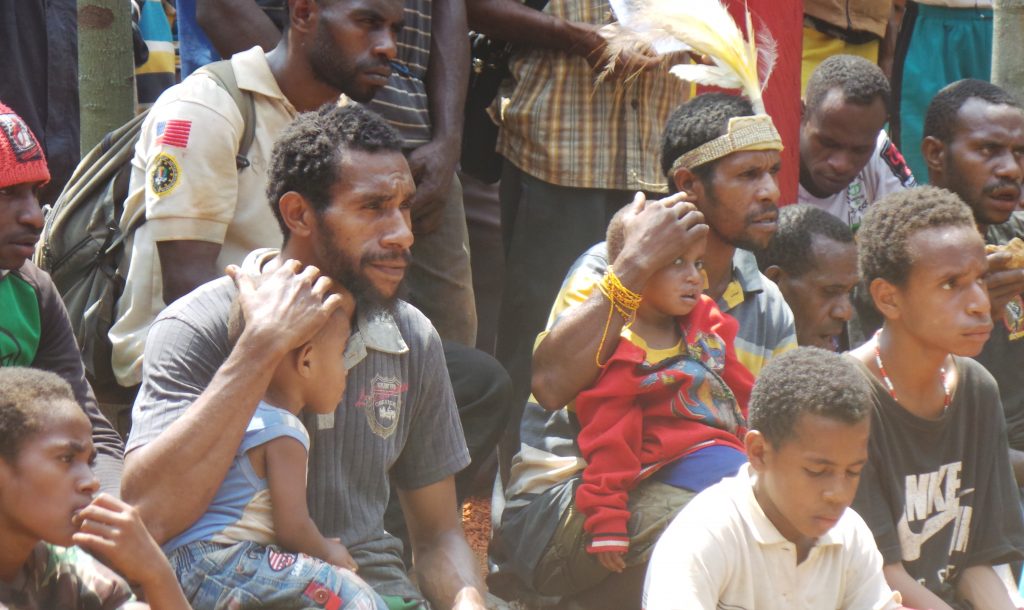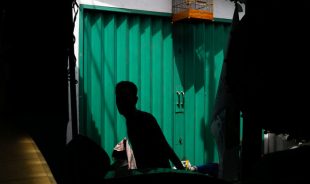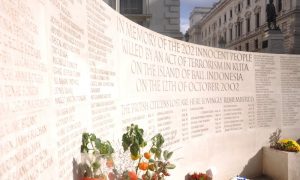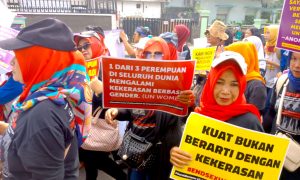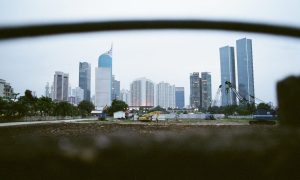With some 11.9 million hectares of oil palm plantations, Indonesia is the world’s top palm oil producer. As available arable land grows scarce in Sumatra and Java, the oil palm frontier is rapidly moving east into West Papua, a region home to over three hundred indigenous groups and half of the country’s biodiversity.
In the south-eastern district of Merauke, where I have been doing ethnographic fieldwork since 2013, oil palm expansion has provoked a range of adverse ecological effects – from deforestation and biodiversity loss to air and water pollution and the erosion of critical ecosystem services such as nutrient cycling and soil formation. Meanwhile, indigenous forest-dependent communities upon whose customary lands plantations are being established face growing local food insecurity, land dispossession, as well as respiratory and skin problems resulting from large-scale forest burning and chemical water contamination. Few among them have found employment opportunities within the agribusiness sector, as many companies prefer to bring in their own labour force or hire non-Papuan migrants.
Tensions over land rights, compensation, and restitution, as well as disappointment over promised but unfulfilled Corporate Social Responsibility and smallholder schemes, have triggered several instances of vertical and horizontal conflict between communities and corporations and within indigenous communities themselves.
Consent on paper
What, according to people on the ground, is the root cause of all these social problems? For many indigenous Marind, it all comes down to consent.
Bernardinus,* a village elder from the Basik-Basik clan, for instance, noted that “oil palm companies come here, obtain government permits and plant oil palm without asking permission from the traditional landowners. They think no one lives on this land because all they see is forest. Sure, Indonesia’s largest remaining forests are in Papua. However, people live in and depend on these forests. Indigenous people like Marind, Mandobo, Auyu, Jair, and many more. We own this land under customary law. And yet our voices are not heard”.
In a similar vein, Perpetua, a mother-of-four living in Khalaoyam village, stated that “Decisions about oil palm projects are made in Jakarta, not in Papuan villages. These decisions are made without our consent or participation. Of course, there are problems and conflict. It’s like planting a tree without making sure the soil is fertile and that there is enough water and shade for the tree to flourish. The tree will grow crooked and struggle to survive. It’s the same with oil palm projects in Merauke. The problem is that there is no consultation or consent”.
The collective right of indigenous peoples—or masyarakat hukum adat (‘customary law communities’) as they are known in Indonesia—to give or withhold their consent to development projects is enshrined in several international human rights instruments that Indonesia has either signed or ratified. This right is perhaps most explicitly formulated in article 32 of the United Nations declaration on the rights of indigenous peoples, which states that:
States shall consult and cooperate in good faith with the indigenous peoples concerned through their own representative institutions in order to obtain their free and informed consent prior to the approval of any project affecting their lands or territories and other resources, particularly in connection with the development, utilization, or exploitation of mineral, water or other resources.
Several laws at the national and regional level also provide the basis for the recognition of indigenous peoples’ right to be consulted on matters that affect their lands, livelihoods, and culture, such as the Basic Agrarian Law and the Papuan Special Autonomy Law. Furthermore, the right to free, prior, and informed consent, or FPIC for short, has now been incorporated within standards adopted by international financial institutions, industry bodies, and multi-stakeholder certification schemes such as the Roundtable on Sustainable Palm Oil. Among Marind communities, as with other indigenous groups that I have worked with in Indonesia, the concept of consent is commonly associated with musyarawah, or communal meetings and deliberations intended to build consensus-based decisions or mufakat. The specific ways musyarawah is carried out in turn, varies according to the customary laws and traditions of different indigenous societies.
Consent in practice
Consent on paper, however, does not guarantee consent in practice. Bernardinus and Perpetua are just two of dozens of community members who report not having been involved in or informed about oil palm developments now taking place in and around their home villages. Another is Kosmas, a Marind participant at a workshop on sustainable palm oil that I organized in July 2019, who told me, “I only found out about that oil palm was coming after the forest had already been cleared. Before that, I knew nothing about the project”.
In a small number of cases, government and corporate bodies have invited indigenous landowners to participate in sosialisasi before land developments. But sosialisasi, a term that can be translated loosely as ‘awareness raising’ or ‘public information dissemination’, is also problematic.
Firstly, sosialisasi often takes the form of a one-way transfer of information about the planned development from the government and companies to the communities, rather than a two-way conversation in which communities have a say in whether or not the project will go ahead, and under what conditions. Secondly, sosialisasi usually takes place in urban centres, such as Merauke City or Jayapura, rather than in the villages where indigenous communities are based. Those invited to attend these events are often handpicked by the government and companies and do not represent the broader interests or rights of the communities to which they belong. Thirdly, sosialisasi meetings are frequently supervised or attended by members of the police and military, who work with oil palm companies in the capacity of plantation security patrols and brokers. Many Marind are reluctant to speak out freely under such conditions for fear of consequent reprisal.
Other impediments to a transparent consent-seeking process relate to substance, timing, and participation. In many cases, the information provided by state and corporate bodies to local communities is either insufficient or partial. For instance, communities are often unaware of the legal implications to their customary territorial rights, the duration and scale of the projects promoted, and the potential environmental consequences of these developments. Land surrender contracts do not specify whether communities will receive compensation for the loss of their lands, whether this compensation accounts for the crops and man-made structures within these lands, how much compensation will be received, by whom, and when. It is also unclear whether communities’ consent to the projects is open to future revision or withdrawal and whether conflict resolution or mediation systems are in place to deal with potential disputes. As a result, community members find it difficult to give fully informed consent to land developments.
As Marcus, a young Marind man put it, “The companies tell us all the sweet things about oil palm plantations – the money we will make, the jobs we will get, the schools they will build. But the promises they make are not written down in the contracts. And the companies don’t tell us about the risks – the water pollution, the burning of the forest, the loss of our trees, game, and sago groves. We are only told half the story.”
When given, information is often only provided to communities once the corporations have received the necessary permits from the government to begin developing the land. “This means [the companies] have the upper hand”, Marind elder Pius reported. “They already have the consent of the government. Whether or not we agree no longer matters. They organize sosialisasi with us, but actually, the decisions are already made”.
Unrepresentative indigenous participation in sosialisasi further undermines the level playing field between local communities and state and corporate actors. According to Marind customary tenure, decisions about lands that are collectively owned by different clans must be made in consultation with all members of these clans. But in practice, only a select number of community members are chosen by the companies to attend sosialisasi. Women and youth tend to be excluded from these negotiations, even though they, too, have rights to land through inheritance, bridewealth and intermarriage. Elite co-optation and one-to-one forms of consultation have in turn provoked widespread tensions among and between clans themselves.
Another problem is the conflation of consultation with consent in government and corporate practice. As Viktor, a Marind elder explained, “just because I attend sosialisasi doesn’t mean I give my consent to the oil palm project going ahead. I come to sosialisasi to learn about the project, but it takes time to make decisions over whether we accept or reject the project. The problem is that the government assumes we are on board with their plans simply because we attend their meetings. Consultation is part of the process of obtaining consent, not consent itself”.
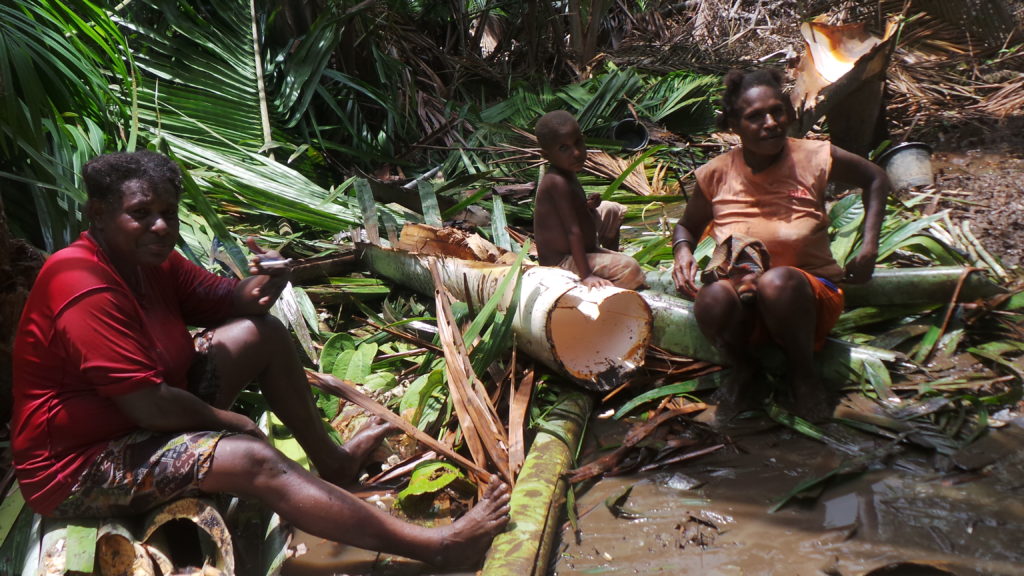
Many Marind continue to derive their subsistence from hunting, fishing, and gathering in the forest. Credit—Sophie Chao.
Meanwhile, Marind villagers who have already voiced their opposition to oil palm projects during consultations complained of being persistently approached, and sometimes intimidated, by company personnel and police officials to surrender their lands for agribusiness development. “They keep coming and asking us to change our minds,” reported village elder Geronimo. “We already said no, but they think that if they keep pushing us, we will agree to collaborate. That is not seeking consent. That is harassment”.
In remote areas like Merauke, support for communities from independent third parties such as non-governmental organizations, conflict mediators, and legal and para-legal experts, is also lacking. Court proceedings are protracted and resource-intensive processes that many communities simply do not have the capacity to sustain. Meanwhile, complaints raised to United Nations human rights bodies, such as the Committee on the Elimination of Racial Discrimination, have had limited impact on the ground because are no binding sanctions in place within these instruments to ensure that redress and remedy are achieved. More than this, several communities members involved in these complaints have been labelled as separatists and criminalized for threatening national interests such as economic growth, infrastructural development, and national food sovereignty.
Indeed, many Marind find it difficult to frame their demands and grievances in the language of “rights” – the right to food, water, and consent itself – because it makes them vulnerable to accusations of seeking political self-determination. As Geraldina, a young Marind woman told me, “All we want is to be able to feed our children and drink clean water. But when we talk about rights, [the government] thinks we are talking about the right to independence. But that is not what we’re talking about”.
Finally, consent-seeking processes in Merauke’s oil palm sector lack legitimacy in the eyes of many Marind because they are not aligned with customary practices of consultation and decision-making. According to the local protocol, consent-seeking must involve the participation of all clan heads, the performance of rituals such as pig sacrifices and ceremonial dances, and iterative deliberations among men, women, elders, and youth. Children, too, must be present at these discussions, even if they do not speak up, because they too will experience the long-term and intergenerational effects of land developments taking place today. Furthermore, many Marind affirm that consultation processes must be undertaken in specific locations, such as ceremonial men’s huts and sacred sites in the forest, rather than in the village or city.
Most importantly, discussions about land must take place on the land in question. As Marcelina, a mother-of-three from Khalaoyam village explained, “When you talk about the land, you must sit on the land itself. That way, our ancestors and our plant and animal kin are part of the process. They too have a right to the land and they too will be affected by oil palm plantations. The land cannot be separated from those who live and depend on it”.
Mental health care in Indonesia: short on supply, short on demand
If he’s serious about building Indonesia’s “human capital”, Jokowi should make mental health a policy priority.
Cultivating consent
What, then, might a transparent and accountable consent-seeking process look like according to Marind?
For starters, Marind community members should be able to access comprehensive information about their rights under local, national, and international laws, to strengthen their bargaining position during land negotiations. Government and corporate representatives, too, need to be aware of their obligation to respect indigenous communities’ right to give or withhold their consent to land developments. Importantly, greater recognition must be given to the customary tenurial systems that govern indigenous peoples’ land use and that pre-date the emergence of both international and national laws regarding land ownership and management. One important practical step towards such recognition involves the use of participatory mapping, which enables indigenous landowners to demarcate customary land boundaries, sites of cultural and economic importance, and distinctive clans’ rights over different stretches of land.
A proper consent-seeking process, according to many of my interlocutors, also requires giving sufficient time to communities to absorb the information provided to them about the project, to deliberate among themselves over its potential benefits and risks, and to seek further clarification or advice from independent third parties. As village elder Bonifacius put it, “These decisions have long-term implications for Marind, for the land, and for the plants and animals of the forest. They are not decisions that can be made overnight”.
In addition, many Marind villagers recommend the creation of more conducive spaces for multi-stakeholder negotiations. For instance, such negotiations should be free of military and police presence, involve all community members, take place on indigenous peoples’ customary lands, and ensure that grievances or opposition from community members do not lead to future reprisals.
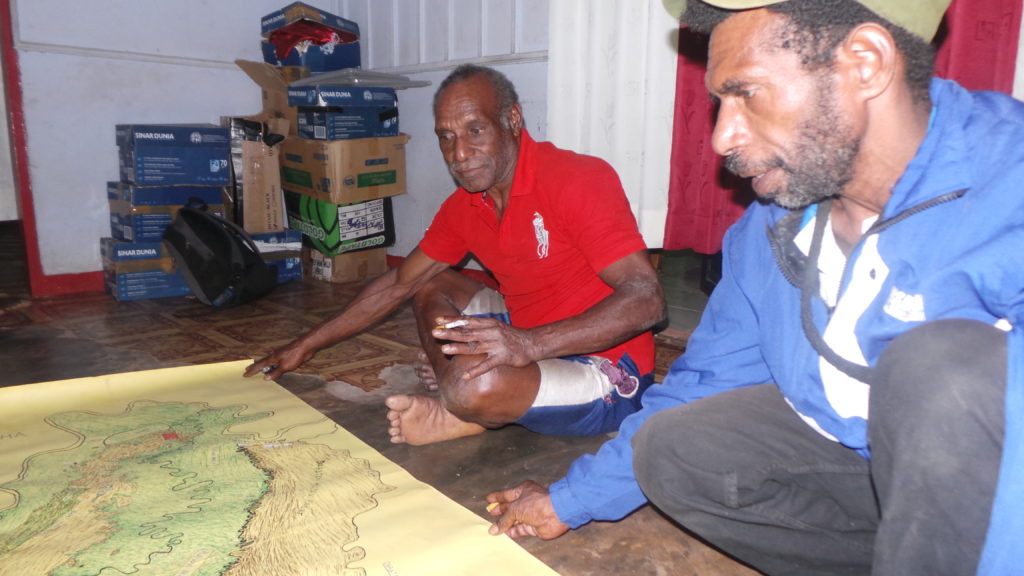
Participatory mapping has proven a useful tool for indigenous Marind to assert their customary rights to lands and forests in Merauke. Credit—Sophie Chao.
Creating an open platform for genuine and safe dialogue, for many Marind, is essential to the long-term sustainability of the projects discussed. As Nero, a Marind youth explained, “If we start from a place of mutual respect, then we are in a better place to come to an agreement. The truth is, not all Marind are against oil palm. Some of us do want to work with the companies. But if we feel we are forced to, if we feel we cannot speak up and set the terms for collaboration, then we feel disempowered and vulnerable. It leaves us with a bitter taste in our mouths. And this is not good for our relationship in the future”.
As Nero’s comment suggests, community consent is not just a right of indigenous peoples and an obligation of states and corporations. Respecting indigenous peoples’ consent is also in the interests of oil palm corporations themselves because it lays the grounds for constructive dialogue, improved social relations, and smooth project implementation. This is backed by a recent study on Indonesia’s palm oil sector that suggests the economic costs of social conflict can represent 51% to 88% of plantation operational costs and 102% to 177% of investment costs on a per hectare per year basis. These material costs are compounded with intangible costs to corporations, such as reputational loss and the risk of future recurring or escalating conflict. Already, conflicts in Indonesia’s plantation sector abound, involving over 217,000 households and representing a third of all land-related conflicts as of 2017 according to the Consortium for Agrarian Reform. These figures do not include the many cases that do not end up being officially reported, notably in rural West Papua.
A moratorium imposed in September 2018 by President Jokowi on new permits for oil palm plantations may help pave the way for more transparent consent-seeking processes in the future. This moratorium will also entail a review of existing permits to clarify the territorial rights of indigenous communities and smallholders and the legality of land acquisition processes to date.
Other promising developments include the One Map Policy, a national initiative intended to address the issue of overlapping land claims and pre-empt future land-related conflicts, and the draft law on the Recognition and Protection of Indigenous Peoples’ Rights. With progress in the implementation of both initiatives remaining slow, however, international standards such as the Roundtable on Sustainable Palm Oil may continue to play an important role in raising the bar on human rights beyond what is required under national law.
But even these standards will require more inclusive participation of indigenous peoples themselves as stakeholders if consent-seeking processes are to suit the local needs, contexts, and customs of different indigenous communities. Most importantly, these standards, and the national initiatives described above must be premised on the understanding that indigenous peoples have the right to give or to withhold their consent to oil palm developments.
As village elder Bonifacius put it, “consent is not about pushing for a “yes” at all costs until we finally agree. Rather, consent is about respecting our right to refuse oil palm projects – even after a long process of consultation. Consent means respecting our right to simply say no.”
* Pseudonyms for persons and villages to protect people’s privacy.
 Facebook
Facebook  Twitter
Twitter  Soundcloud
Soundcloud  Youtube
Youtube  Rss
Rss 